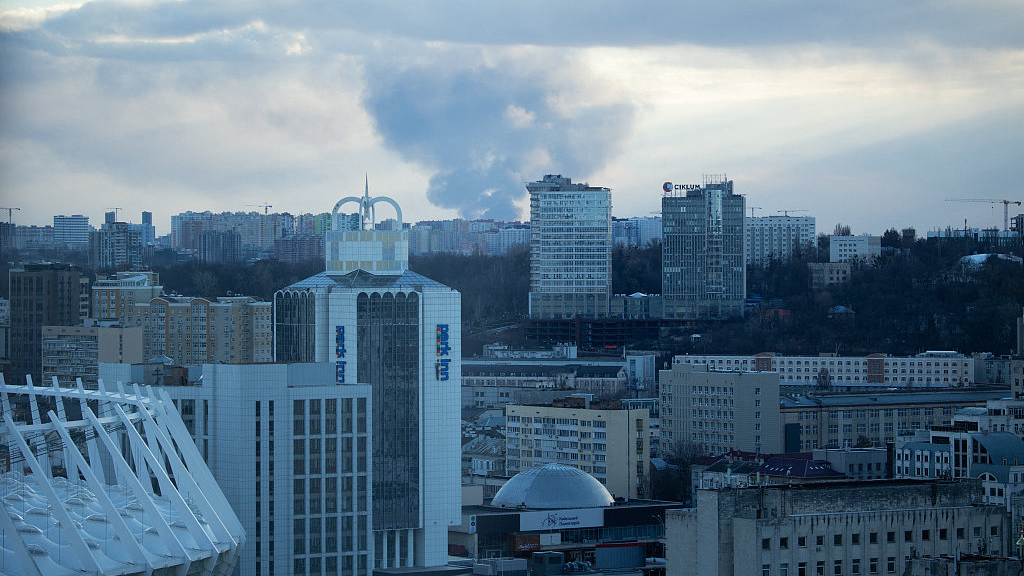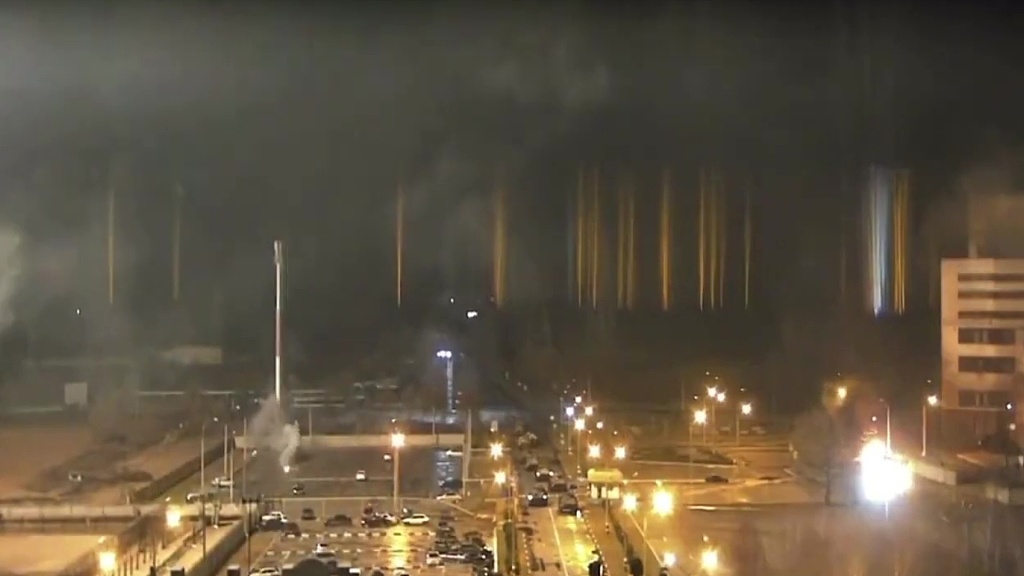
A fire broke out at an oil storage facility in the city of Vasilkov near Ukraine capital, February 27, 2022. /CFP
A fire broke out at an oil storage facility in the city of Vasilkov near Ukraine capital, February 27, 2022. /CFP
Editor's note: Nikola Mikovic is a freelance journalist based in Serbia. He covers mostly Russian, Ukrainian and Belarusian foreign policy issues and writes for multiple web magazines. The article reflects the author's opinions, and not necessarily those of CGTN.
War in Ukraine has already changed the world. The West has imposed severe sanctions on the Russian Federation, and Moscow now has little choice but to strengthen its cooperation with Asian countries. How will a new geopolitical reality affect Europe?
Despite harsh rhetoric, sanctions and countersanctions, the European Union and Russia continue to do energy business as usual – at least for the time being. Physical deliveries of natural gas from Russia to Europe through various pipelines have so far remained largely unchanged. The problem, however, is that the energy prices are skyrocketing.
It is a well-known fact that as much as 40 percent of Europe's natural gas supply comes from Russia. Some countries, especially in the Balkans, are 100 percent dependent on Russian energy. If the European Union – be it voluntarily or under pressure from the United States – eventually stops purchasing Russian gas, economies of many nations on the continent are expected to suffer.
Such a move would undoubtedly hit Russia, too. At this point, the Kremlin does not seem to be interested in halting gas supplies to Europe – where its major market lies – but the very dynamic of events around Ukraine suggests that not a single option should be put off the table.
The EU, according to Reuters, is already preparing to reduce gas imports from Russia, but the problem is that other producers cannot replace the Russian Federation as the main energy supplier, at least in the short term.
Thus, some form of energy transition and diversification in Europe seems to be inevitable, although the process is expected to be very painful for the European consumers. Russia, for its part, will likely lose significant revenues if the Western energy market remains closed, and the Kremlin will eventually have to engage into a new Perestroika.
So far, Russian economy was heavily dependent on energy exports, as well as on imports of various goods from the European countries. As a result of the sanctions, Moscow will either have to adopt a new economic model, and to start a process of reindustrialization of the country – which could last for years, if not decades – or to change its economic and political vector from the West to the East.
Indeed, the process of "de-coupling" between Russia and the West will have tremendous consequences for the current global order. But what will be the fate of Ukraine?
The war-hit country has already been devastated. It will take years for Ukraine to recover from the tragedy it is experiencing. The very fact that the Russian troops have established control over at least two Ukrainian nuclear power plants could mean that the Eastern European nation – or at least those parts that will be in the Russian sphere of influence – will not have problems with electricity supplies.

A screen grab captured from a video shows a view of Zaporizhzhia nuclear power plant during a fire following clashes around the site in Zaporizhzhia, Ukraine, March 4, 2022. /CFP
A screen grab captured from a video shows a view of Zaporizhzhia nuclear power plant during a fire following clashes around the site in Zaporizhzhia, Ukraine, March 4, 2022. /CFP
In the long term, Ukraine and Russia will likely have to sign a peace deal, but at this point nothing suggests that the war will be over any time soon. Certain Western countries, including Germany, Finland, France and Sweden, have already supplied the Eastern European nation with weapons, while the United States and NATO have rejected Ukrainian President Volodymyr Zelenskyy's call for a no-fly zone over the former Soviet republic.
Moreover, some reports suggest that Poland could eventually supply Ukraine with fighter jets. Indeed, without air support, Ukrainian troops may eventually lose control over strategically important cities, including the capital Kyiv.
On the other hand, it will be difficult for the Russian army to maintain law and order in parts of the country that are already under its control. Thus, it will take years for Moscow to win hearts and minds of the Ukrainian population, which is, at least from the Kremlin's perspective, a necessary step in the process of "denazification" of the Eastern European country.
"Demilitarization" of Ukraine, according to President Vladimir Putin, is another Russian goal. But as long as the West continues to supply the Ukrainian army with weapons, it will be impossible for the Kremlin to implement its agenda.
Even if Russian troops eventually seize Kyiv, Ukrainian armed forces are expected to continue providing resistance in western parts of the country. Therefore, without a political deal, Ukraine can turn into another Syria, where a brutal war has been going on for 11 years.
However, Russia's sanction-hit economy can unlikely afford to fight a long war. Moreover, it will be very expensive for Moscow to feed millions of people in regions of Ukraine that are already under the Russian control. That is why the Kremlin needs an exit strategy.
Given that the West, particularly the United States, still has an enormous influence over Ukraine, sooner or later Russian and Western leaders will have to hold a virtual summit that will result in the end of hostilities on the ground. Meanwhile, the world – and especially Europe – will likely adapt to a new reality in which cheap energy will be the thing of the past.
(If you want to contribute and have specific expertise, please contact us at opinions@cgtn.com. Follow @thouse_opinions on Twitter to discover the latest commentaries on CGTN Opinion Section.)

